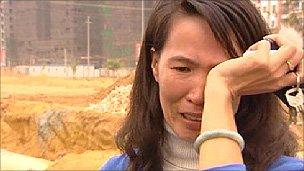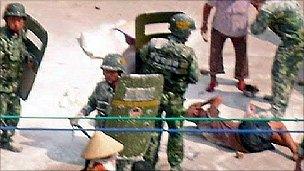China's fear of Middle East-style unrest
- Published
The BBC team faced violence from Chinese state security officers while filming last weekend
China's government has, in recent days, responded to calls on the internet for Middle East-style popular protests in Chinese cities by rounding up dozens of human rights defenders, lawyers and others.
Human rights groups say a broad crackdown is under way and at least 100 people have been picked up or warned by the authorities. Some of those taken by the security services have vanished without a trace. Human rights organisations say such detentions are illegal under Chinese law.
The authorities have also moved to limit the relatively free reporting they have allowed in China since the 2008 Olympics. They have banned foreign journalists from filming in several public places in the capital, Beijing, including the city's most famous shopping street, Wangfujing.
Several reporters, including our BBC team, faced violence from Chinese state security officers when we tried to film on the street last weekend.
A reporter from Bloomberg News was attacked, dragged into a building, punched and kicked in an assault that lasted over 10 minutes. Other reporters have been warned that if they try to film this weekend they may be expelled from the country.
With the country's annual People's Congress to begin on Saturday, China's Communist Party rulers appear to be seriously concerned about he possibility of popular pro-democracy protests.
So right across China the police are on edge. Last Sunday hundreds of uniformed officers flooded the shopping streets and squares in Shanghai, Beijing and other cities where the internet messages had called on people to gather.
There were thousands more plainclothes officers on duty, often poorly disguised as street cleaners, or ordinary shoppers.
In Shanghai police dragged several people away, and in Beijing we were stopped as we tried to see if anyone would heed the call to protest.
As we showed our documents to uniformed police and waited for their clearance to move on we were set upon by plainclothes thugs.
The police officers even helped them as I was dragged by the hair, shoved against the side of a police van, then slammed to the floor. Deliberately they crushed my leg in the vehicle's door.
Tensions and conflicts
So why you have to ask is China lashing out? What are its authoritarian leaders so worried about?
The Communist Party-led government faces small protests around the country every week. What happened late last year, in the village of Baihutou in the south of China is a typical case.
A group of villagers had been resisting what they said was a land grab by the local authorities who were trying to force them out of their homes to develop the area.
Local governments rely on the profits from development for income. And it is often claimed such projects are easy sources of corruption too.

Feng Guang Mei says the charges against her husband Xu Kun are unjust
In October 2010, the authorities sent a huge squad of armed riot police into Baihutou village.
Wrecking crews with mechanical diggers destroyed five houses belonging to people who were refusing to move out. Still pictures seen by the BBC show riot officers beating people with batons.
This week three of the villagers who had tried to stop the demolitions were put on trial, some charged with obstructing official business.
Feng Guang Mei's husband, Xu Kun, the democratically elected village chief who led the campaign against the appropriation of their land, was one of those in court.
Outside the courthouse, his wife, in tears, told me: "What's happened to my husband is really unjust. This kind of act by the government makes it impossible for common people like us to live a good life.
"Right now I really feel it is very difficult to be a good person."
The authorities claim Xu Kun was profiting illegally by collecting fees from a car park. But the land with the car park had been assigned to the village by the authorities specifically so people could earn an income from it.
The family's legal advisor Liu Wei says the government is prosecuting Xu Kun out of nothing more than malice.
"First, regarding the claim the car park was run as a business, Xu Kun did not offend any part of our criminal law. Anyone who knows the law can tell you that easily," she said.
"From the time he was arrested to today the government's treatment of him has been inhuman. It all shows that this is simply an act of revenge against Xu Kun by the government."
Civil rights
There are tensions and conflicts like this every day all over China. Despite the booming economic growth there are millions who feel shut out, angry at official corruption, at inequalities that are rising, at land grabs. That's why the government is so concerned about the possibilities for unrest.
Feng Hai Bo's mother was also on trial. He took us to see where his family home used to be. Now it is just a pile of rubble, bulldozed to the ground even before the family could get their possessions out.

In October 2010, the authorities sent a huge squad of armed riot police into Baihutou village
"They simply surrounded our house, and pushed it over," Feng Hai Bo tells me. "My father and I tried to stop them, but we couldn't, they had too many armed police. They dragged us out and demolished it."
China's rulers worry these small disputes could snowball into something bigger. They are particularly worried about the way the internet or images in the media can stir up public opinion.
Feng Hai Bo certainly feels unjustly treated.
"The biggest problem is that our civil rights are not respected. I feel that the way the government treats ordinary people is really unjust. Even our personal freedoms aren't protected."
Just five minutes walk from Feng Hai Bo's demolished home you find an amazing site, a beautiful white sand beach. There are people playing on jet skis, girls jumping in the surf having their pictures taken. The contrast with the demolished village nearby couldn't be greater.
Those on the beach are China's newly wealthy middle classes, decked out in sunglasses and sunhats, strolling on the sand, enjoying a holiday.
You can see why the land next to the beach is suddenly so valuable, and also why tensions in China are growing over the rising inequalities here.
It's why the government is so worried about the social instability that could result.
At the court house the trial of Xu Kun and the others lasted one day. A member of their legal team said he was prevented from even submitting evidence for the defence.
The verdict will come in a few weeks. Outside a small group of villagers shouted support for the prisoners as they were driven away in police vans. Then the villagers headed off.
There is discontent in China, but no sign broader Middle-East style protests will happen here.
The ruling Communist Party has as firm a grip on power as ever. But with so many small disputes around the country, it seems profoundly worried by the call for popular demonstrations.
If you want to have the innovation, power and prosperity of the USA then you need your people to power it. They cannot do that when there is no proper rule of law. (Tony, UK)
As a Chinese, I feel terribly disappointed for this. It seems that there is no democracy in China. Such shocking event happened, but the civilians even didn't know what had happened around us, we know nothing about what our government have done except some most important affairs such as NPC (National People's Congress, the annual parliament session) (Soul, China)
Pure Sinophobia! Exactly the same spin could be placed on the UK's student "popular uprising" against the education cuts or the civil unrest in Wisconsin over the threat to union rights. To try and link this to Middle Eastern demands for revolution is just ridiculous! (Andy, UK)
Such high-handedness on the part of officials is common in India. But court is powerful, and it can interfere and help the poor people. Besides the media can also report on such events without fear. This is not the case of China. Where there is no democracy, like in Egypt or Libya, anything can happen anytime. (Singan, India)
If dissidents could manage to mobilise a few hundreds or thousands of their countrymen to stage street protests, the Communist Party could mobilise millions. Sadly this is the true fact of life. The Chinese Government will take its own time to democratise its political system as it sees fit and proper. Such changes would be implemented without up-rooting the stability of its socio-economic system. (TK, Singapore)